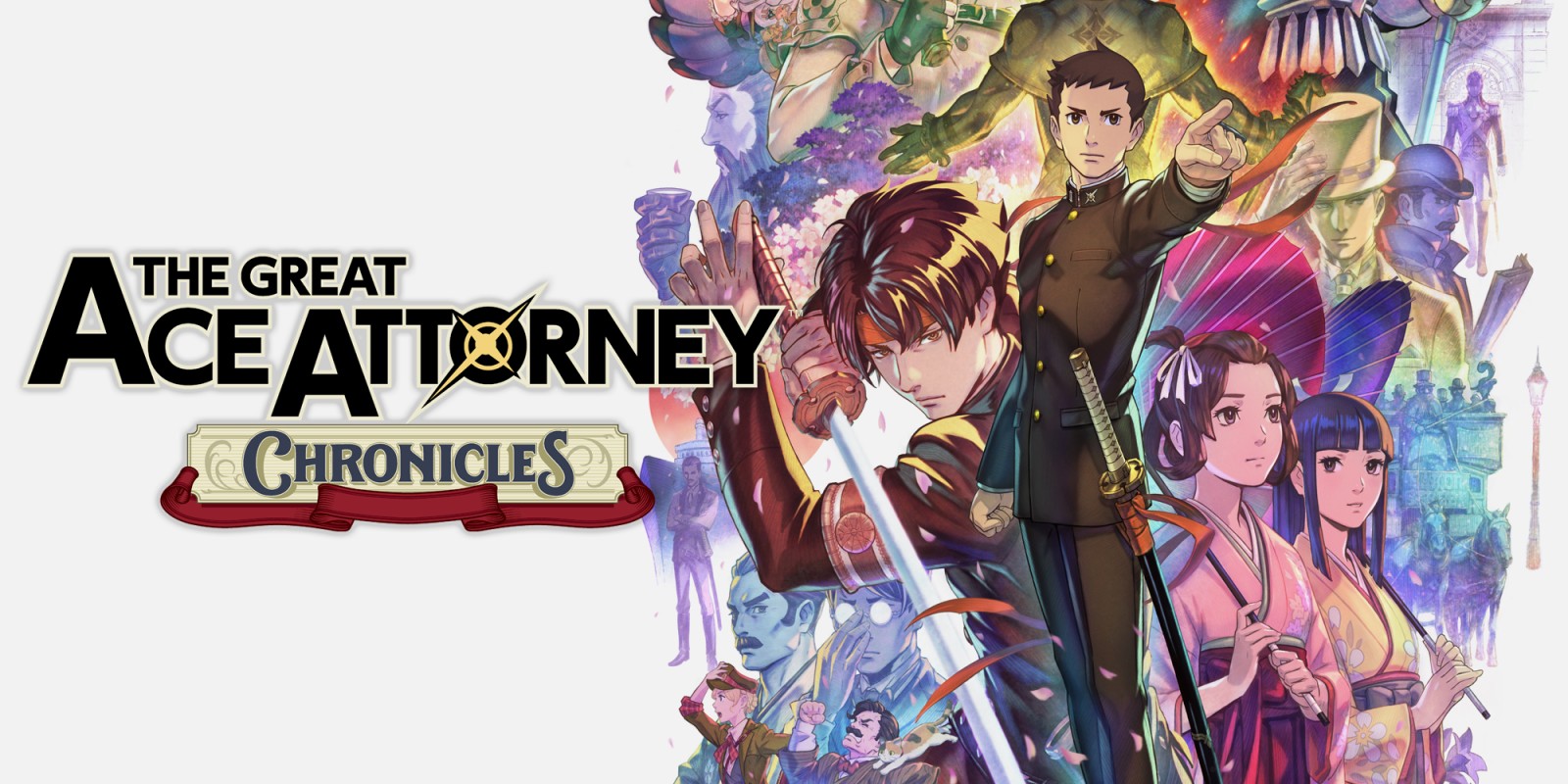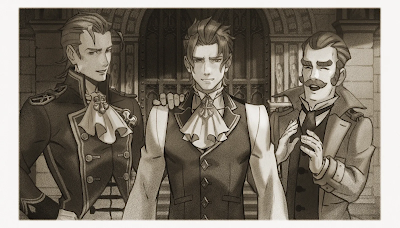Way back in 2018, I wrote two articles where I examined the Ace Attorney series. I specifically focused on the theme of parenthood, or more specifically, the bond between parents and their children and the profound impact this bond has on those children. Since then, the previously Japan-exclusive 'Great Ace Attorney' games have finally been localized in a 'Great Ace Attorney Chronicles' bundle. And now that I've had the opportunity to play them, I can tell you the theme of parenthood also plays a vital role here. Let's talk about it. This article will fully spoil The Great Ace Attorney Chronicles (both games), so readers beware!
From Across the Sea
The Great Ace Attorney games are about Ryunosuke Naruhodo's adventures as a lawyer as he travels from Japan to Great Britain in the early days of an alliance between these empires. As Ace Attorney games do, they pose questions about the law and justice as you defend clients from false murder charges. But the universal, timeless theme of family is just as present here, even though it may initially not seem that way. Like Ace Attorney Investigations 2, the Great Ace Attorney games take some time to build up before they show the true extent of this theme in the narrative.
Fathers - The Great Ace Attorney 1
In the prior Ace Attorney games, both mothers and fathers played an important role, from Misty Fey to Gregory Edgeworth. In the Great Ace Attorney, the focus is mainly on fathers. Let's go through each example in order of appearance:
Ryunosuke's partner througout the game is Susato Mikotoba, and the first parent to become significant to the story is her father, Yujin Mikotoba. He is a kind and supportive father whose role in the story becomes more important in the second game.
In the third case we are introduced to Gina Lestrade, who is an orphan and a very endearing character with a great theme song. Her having no parents leads to an important and ultimately tragic development in the second game.
At around the same time, we meet Iris Wilson, believed to be the daughter of John H. Wilson. She hasn't ever met her father and Herlock Sholmes is taking care of her in his stead. Quite tragically, John H. Wilson actually died in the first case. Fortunately Iris doesn't find this out until she also discovers that John Wilson was not actually her father after all - more on her true parentage later.
Finally, the murderer in the final case, Ashley Graydon. A shocking relevation comes up in the final trial when it's revealed his last name is actually Milverton, and the victim in the third case - Mason Milverton - was his father.
The Great Ace Attorney does a lot of setting up for the second game, which holds the true climax of the story. I haven't even mentioned some of the most critical characters yet, like Kazuma Asogi - mainly because he "dies" at the start of the 2nd case. But he and his parentage become a very important part of the story in the 2nd game as well.
Fathers (and a Mother) - The Great Ace Attorney 2
In TGAA2, Yujin Mikotoba continues the trend of being a good father, helping Susato defend her friend in court in spite of women not being allowed to work as defense lawyers at the time.
Gina Lestrade makes her return, working for the police under Tobias Gregson. Gregson ends up taking on a parental role, helping this young orphan find a purpose for herself. This heartwarming development turns to tragedy when Gregson dies in the final stretch of TGAA2.
The next two parental figures are the most critical to the overarching story, with their influence reaching back as far as the first game, which is why it's so interesting that they are only truly introduced over halfway through the second game:
Genshin Asogi. At the end of the third case, it's revealed that Kazuma Asogi's father was convicted as a serial killer known as 'The Professor.' He's one of the reasons why Kazuma came to Great Britain in the first place - to find out the truth behind his father's death. He believes his father was unjustly executed, and he is completely correct, because the real serial killer was...
Klint van Zieks, brother of the games' prosecutor Barok van Zieks and the Professor's supposed last victim. The shocking revelation that he is the true serial killer proves that Genshin Asogi was completely innocent, aside from killing Klint van Zieks himself. But the final reveal that completes the circle is that after Klint's death, Yujin Mikotoba went to find Klint's wife, who was about to go into labor and gave birth to a child. She tragically died in the process. The child she gave birth to is the girl known as Iris Wilson.
Gotts, a child who appears as a witness in the third case, could technically be seen as relevant because his father is the King of Bohemia. However, while this is another fun way the series shows how your parents can affect your status and attitude, it's mostly played as a joke and doesn't tie into the overarching story.
Legacy
Ace Attorney is a series where both family and death are major themes. As a result, the series often looks at how the bonds between parent and child continue after death, for better or for worse.
Kazuma and Ashley were both consumed by their fathers' deaths and it led them both down a dark path, with Kazuma only barely escaping his fate. I think it's very poignant that Karuma - Genshin Asogi's katana that Kazuma inherited - proves to be both the way Kazuma almost condemns himself and the tool that saves him from condemnation. Kazuma was very close to killing Tobias Gregson with his father's sword as an act of vengeance, but backed down at the very last moment. Then, during the trial, Ryunosuke discovers the vital clue to find the mastermind behind the Professor killings in the hilt of same sword, clearing the Asogi name once and for all. If Kazuma had committed to taking vengeance with Karuma, his father's legacy, he would have been arrested and convicted and the truth would've been lost forever. But because he held back, and with the help of Ryunosuke, his father's legacy saved him instead.
Iris is consumed by the idea of finding out who her father is, obsessing over the stories of her father with Herlock Sholmes. The story plays along with this as well; initially we are made to believe John H. Wilson was her father, then it's implied Yujin Mikotoba might be her father and finally it's revealed to have been Klint van Zieks - a hated serial killer. Iris doesn't find out who her biological father is in the story, but her arc comes to a heartwarming end. She realizes that it is not blood that makes a father. She fully acknowledges Herlock Sholmes - who raised her and cared for her all these years - as her father in the end. And in some way, it's not entirely unreasonable to consider Yujin Mikotoba her father as well. He was the one who brought her into this world, named her and took care of her with Sholmes until he had to return to Japan. Ryunosuke says it all when he describes Sholmes, Iris, Yujin, Susato and himself as a family.
And Gina finally found a father figure, a person to look up to, only to tragically lose him again. She initially believes she has no reason to remain with the force anymore, until she's given Gregson's pocket watch that he used to diligently wind up every night, a symbol of his dedication, now stopped. She inherits the pocket watch from him, and with it, his legacy. She decides to become a fully fledged police detective in his honor. She's finally found her own place in the world.
Conclusion & Some Thoughts
Like other games before it, The Great Ace Attorney has strong themes of parenthood being something more than just being related by blood. It also shows us that the memory of those who pass away can be a blessing and a curse, depending entirely on how you deal with it. Obsessing over their deaths to the point that vengefulness leads to more death and destruction is a path that leads to ruin. But learning from those who love you and carrying on their legacy can help you find your place and it might even save your life.
In my prior analyses of the 'parental bonds in Ace Attorney', I didn't really draw any particular conclusion beyond the premise of the articles. I just demonstrated how present the theme is throughout the franchise. I've tried to do better with this article and I also want to draw attention to how the more unique ways The Great Ace Attorney handles this theme.
Yujin Mikotoba is a kind, supportive father figure who is present, alive and does not get killed in the story. This is extremely unusual for the series, but also serves as some great misdirection. Depending on the clues and foreshadowing you pick up on, you may be led to the wrong conclusion that Yujin is the Professor or is at least involved with the conspiracy. It makes the real twist that he's Sholmes' true partner and an all around great person all the more surprising and delightful.
I also really like the literal double edged sword of Kazuma inheriting his father's sword and the role it plays in his story. We've seen a parent's legacy be helpful or harmful to characters in the series, but not in such a way that it was both the instrument of his (almost) doom and his redemption. It really reinforces what I said earlier; that the memory of those who are gone can affect us in completely opposite ways depending on how we handle it.
_
Thank you for reading!
As a final note, it's been a long time since the series has seen a proper new game release. I'm very excited to share my thoughts with you again once Ace Attorney 7 comes out, although I might also just start on that article about siblings in the Ace Attorney series that I teased in... uh, 2018. It's been a while. On that note, it's also been a long time since I posted any article at all. Let's just say life's been busy and unpredictable. Here's hoping for more articles soon!









No comments:
Post a Comment